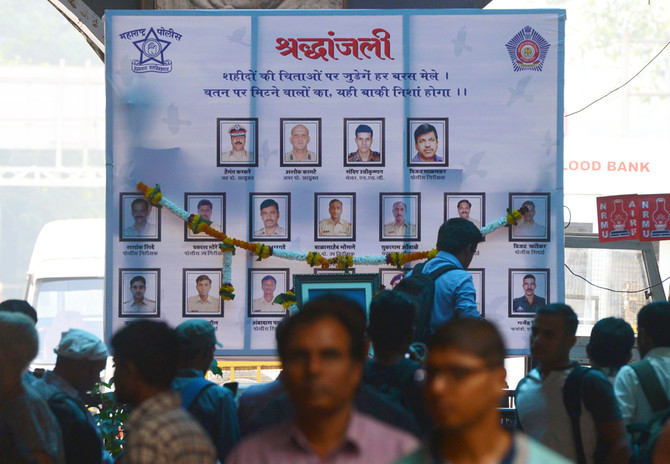NEW DELHI: The planners of the deadly 2008 Mumbai terror attacks “still roam the streets of Pakistan with impunity,” India said on Monday, as it marked the 10th anniversary of the bloodshed.
Militants lay siege to the coastal city on Nov. 26, 2008, and stormed targets including hotels, a railway station and a hospital.
The coordinated shootings and bombings killed 166 people and injured hundreds more. The violence was blamed on Pakistani nationals.
“It is a matter of deep anguish that even after 10 years of this heinous terror attack, the families of 166 victims from 15 countries across the globe still await closure, with Pakistan showing little sincerity in bringing perpetrators to justice,” India’s Ministry of External Affairs said.
It urged its nuclear-armed rival to “give up double standards,” adding: “This is not just a matter of Pakistan’s accountability to the families of the innocent victims who fell to terrorists, but also an international obligation.”
US Secretary of State Mike Pompeo asked Pakistan to uphold its UN Security Council obligations to implement sanctions against those responsible for the attacks, including the militant group Lashkar-e-Tayyiba and its affiliates.
He also announced a $5 million reward for information leading to the arrest or conviction in any country of any individual who committed, conspired to commit, or aided or abetted the execution of the attack.
Prof. Harsh V. Pant of the Observer Research Foundation (ORF), a New Delhi-based think thank, told Arab News: “There’s a sense of victimization in India and a strong sense of grievance among people about a lack of justice in the 26/11 attack.”
He said: “For any Indian government, it would be difficult to enter into any sort of long-term peace process with Pakistan unless it’s done to ameliorate the 26/11 grievances.”
He added: “Terror attacks keep on taking place in Kashmir, but for most Indians it’s far off. Mumbai is something that happened in the mainland... People saw it closely. In that context, we shouldn’t underestimate the power of sentiment.”



















